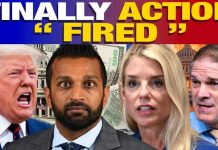
Dan Bongino’s shocking discoveries inside the FBI have left even the most hardened conservatives questioning how deep the rot of politicization and weaponization really goes—and what, if anything, can be salvaged from the Bureau’s battered foundations.
At a Glance
- Dan Bongino appointed FBI Deputy Director in early 2025, bringing a law enforcement and conservative commentator background.
- Bongino claims to be “shocked to his core” by politicization and weaponization within the FBI.
- New leadership under Director Kash Patel and Bongino vows sweeping reforms to restore trust and depoliticize the Bureau.
- Critics argue these moves risk further politicizing federal law enforcement, while supporters see a long-overdue course correction.
Bongino’s Bombshell: Inside the Bureau’s Troubled Halls
The appointment of Dan Bongino as FBI Deputy Director has set off tremors across Washington. Unlike the usual parade of career bureaucrats, Bongino’s background in the Secret Service, his stint with the NYPD, and his years spent exposing federal overreach behind a microphone give him a unique—and some would say, much-needed—perspective on the Bureau’s internal rot. Bongino’s own words tell the story: he’s “shocked to his core” by what he’s uncovered since stepping into the role. According to statements from Bongino, the extent of the FBI’s politicization, the degree to which federal power was allegedly weaponized against everyday Americans, and the entrenched culture of partisan influence left behind by previous leadership defy belief. For years, the American people have suspected something was off. Now, with Bongino at the helm, sunlight is finally streaming into the agency’s darkest corners.
Bongino’s predecessor, and the entire leadership cohort that presided over the Bureau during what many on the right consider the darkest period of its history, are out. New Director Kash Patel, a Trump ally with no patience for bureaucratic foot-dragging, has made it clear: the days of a two-tiered justice system are over. Public statements from both Patel and Bongino emphasize a commitment to rooting out ideological bias and restoring faith in the FBI’s core mission—law enforcement, not political enforcement. But the challenges are immense.
Career staff, many of whom spent years under a regime that rewarded political loyalty over professionalism, are reportedly bracing for sweeping changes. Some Democrats and former Bureau officials complain that the new leadership is itself “politicized,” but for conservatives, these objections ring hollow after a decade of weaponized justice and selective prosecutions.
Rebuilding Trust or Fanning the Flames?
Bongino’s appointment and his revelations have reignited the debate over the FBI’s future. Supporters across the conservative spectrum argue this is the leadership shake-up the Bureau has desperately needed. After the debacles of the 2016 and 2020 election investigations, the Russia hoax, and the steady drip of whistleblower reports about selective enforcement and internal “resistance” to elected leadership, faith in the agency among regular Americans has never been lower. For Trump voters, Bongino’s arrival is a sign that the days of the Bureau acting as an arm of the Democratic Party are over.
They see a man who understands the Constitution, respects law and order, and isn’t afraid to call out incompetence or corruption. Critics, predictably, see only a “political purge.” Congressional Democrats and some legacy media outlets insist that the very act of appointing conservative reformers is an attack on the Bureau’s “independence,” a laughable claim after years of open collusion with partisan interests. But the facts remain: Bongino was brought in precisely because the old way failed, and the public is demanding real accountability.
The scope of the reforms underway is staggering. Internal reviews are already in progress. Patel’s team is combing through personnel files, re-examining high-profile cases, and reasserting the Bureau’s obligation to the rule of law. Bongino has made it clear: every agent, analyst, and administrator will be held to the highest standards—regardless of their politics. For some, the new regime is a breath of fresh air; for others, it’s a wake-up call. Either way, the days of unchecked power and partisan gamesmanship are over—at least for now.
The Road Ahead: Reform or Ruin?
The stakes could not be higher. In the short term, Bongino’s leadership is expected to trigger significant turnover among the Bureau’s top brass. Morale, already battered by years of public scandals and internal strife, is a wild card. Will career professionals rise to the challenge and help rebuild an agency that has lost its way, or will they resist, dragging their feet and undermining the reforms? The answer may determine not just the future of the FBI, but the very fabric of American law enforcement. The ripple effects extend well beyond Washington. State and local law enforcement agencies, who for years have watched federal priorities shift from crime-fighting to political vendettas, are watching closely. If Bongino and Patel succeed, the FBI could reclaim its mantle as the world’s premier law enforcement agency. If not, the Bureau risks sliding further into irrelevance and public mistrust.
Long term, the challenge will be sustaining reform in the face of relentless opposition from entrenched interests, hostile media, and a political class deeply invested in the status quo. Bongino’s critics warn that the politicization of the FBI is simply being reversed, not eliminated. Supporters counter that only by clearing out the old guard and reasserting the agency’s constitutional mission can the Bureau ever hope to regain the trust of the American people. One thing is certain: the American public is watching—and this time, they’re not going to accept excuses.
Expert Voices: Realignment or Retaliation?
Experts are divided, often along ideological lines. Law enforcement veterans warn that any whiff of political loyalty tests the Bureau’s credibility and effectiveness. Academic observers remind us that politicization, whether from the left or right, is corrosive to democracy and the rule of law. Yet, for every critic wringing their hands about “independence,” there are legions of ordinary Americans who are tired of being lectured about the supposed sanctity of institutions that, in recent years, have done little to earn their trust. Bongino, armed with decades of field experience and a willingness to speak hard truths, is betting that transparency, accountability, and a return to first principles will carry the day.
The battle for the Bureau’s soul is underway. Whether Bongino’s shock turns into real, lasting reform—or whether the FBI remains just another pawn in the endless chess game of Washington politics—remains to be seen. But for the first time in years, there’s hope that common sense might finally return to the front lines of American justice.




